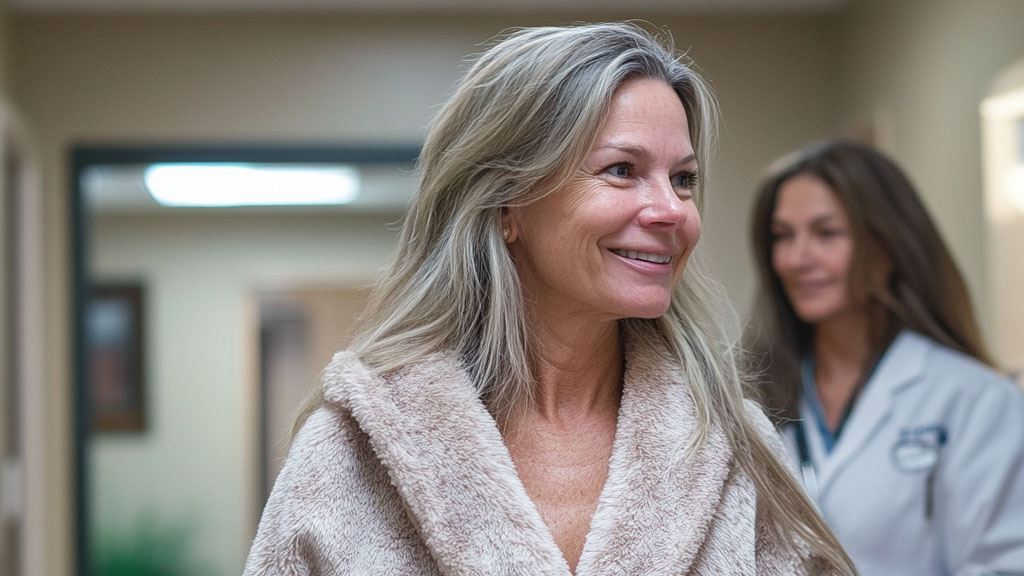Are you up to date with your mammograms? A recent study indicated that 41% of women say they’ve either skipped their annual mammogram or delayed getting it done over the past year. And that’s concerning, says Rachel O’Connor, MD, a fellowship-trained breast radiologist in the Inland Northwest, because regular mammograms are crucial for finding and treating breast cancer successfully.
“Mammograms are sophisticated today, and they can find cancers so small that a patient can’t even see or feel them,” Dr. O’Connor explains. “When you find cancer that early, it can often be completely cured.”
In November 2024, the brand-new Northwest Breast Imaging Center will open its doors, giving women in North Idaho easy access to mammograms and other breast imaging tests. Let’s learn more about who needs an annual mammogram, why you should get one, and explore how the Northwest Breast Imaging Center will deliver a one-of-a-kind mammogram experience.
When should I get my first mammogram?
Some women skip their mammograms because they think they’re “too young” to have breast cancer. Unfortunately, breast cancer diagnoses in women under 50 have been rising by 2% each year for the past five years. To help stop this trend, many national organizations have updated their breast cancer screening guidelines.
So, when should women get their first mammogram? “We follow guidelines from the Society of Breast Imaging, which recommend that women at average risk for breast cancer get their first mammogram at age 40 and continue getting one each year thereafter.”
For women at higher risk, recommendations are to alternate a screening mammogram and a breast MRI once every six months starting at age 40. Your primary care doctor or OB/GYN can help you determine your risk and create a screening plan that works best for you.
Why do I need a mammogram?
Three great reasons why women should get their annual mammogram.
1. You’ll gain peace of mind
One of the biggest benefits of a screening mammogram is that you can either rule out breast cancer or find it early. While some women put off screening because they’re concerned they might find out they have cancer, most mammograms are negative. According to the American College of Radiology, 90 out of 100 women who get a screening mammogram will receive a normal test result (meaning no cancer). The remaining 10 will be asked to return for a follow-up test, and more than half of them will also be reassured their mammograms are normal.
What if your mammogram finds cancer? The good news is that, in many cases, breast cancer can be treated. Thanks to mammograms, breast cancer deaths in the U.S. have decreased by nearly 40% since 1990.
2. Mammograms are highly accurate
Studies show that mammograms can detect between 85% to 90% of all breast cancers. Even better, today’s sophisticated technology allows imaging specialists to capture more detailed views of the breasts during your mammogram.
One important technology to look for is 3D mammography, also called tomosynthesis. A 3D mammogram takes multiple images of the breast, then combines them into a 3D model. This approach gives radiologists full visibility and empowers them to detect even the smallest of imperfections.
3. You can learn more about your breast health
A leading risk factor for cancer—one that’s often misunderstood—is having dense breast tissue. You won’t know your breast density based on the look, feel or shape of your breasts, and you can’t check your breast density with a breast self-exam. The only way to know if you have dense breast tissue is to have a mammogram.
Dense breasts make it challenging for doctors to find certain breast abnormalities. That’s because dense tissue appears white on a mammogram image, which is the same color as dense breast tissue.
New regulations from the Food and Drug Administration require all healthcare providers, including those at Northwest Breast Imaging Center in Post Falls, to notify women about their breast density in their mammogram report. If your mammogram indicates that you have dense breasts, your provider may recommend additional screening, such as a breast MRI or breast ultrasound.
Where to find compassionate, expert imaging services in North Idaho?
If you live anywhere in North Idaho, including Coeur d’Alene, Post Falls, Athol, Sandpoint and Kellogg, getting a mammogram is about to become easier. Northwest Breast Imaging Center is reimagining what it’s like to get a mammogram.
When it opens in November 2024, our center will offer the highest level of breast imaging services in a comfortable, efficient setting. Our center will include three fellowship-trained breast radiologists, Dr. O’Connor, David Spak, MD, and Jacob D. Harris, MD. They’ll be joined by expert technologists who will help you feel at ease.
What’s more, Northwest Breast Imaging Center will feature the latest innovations in radiology, including:
- Two 3D mammogram machines
- Breast ultrasound
- Breast MRI
- MRI biopsy
- Stereotactic biopsy
- Ultrasound biopsy
Should you need a higher level of breast care, our team at Northwest Specialty Hospital can help you navigate the next steps in your treatment.
“We’re excited to see you,” Dr. O’Connor says. “If you’re 40 or older, we recommend you come in, get your screening mammogram and take care of your health. We’ll treat you like you’re a member of the family, putting your comfort first.”
The Northwest Breast Imaging Center is conveniently located at 750 N. Syringa St., Suite 190, in Post Falls. We’re open from 7 a.m. – 5:30 p.m. Monday through Friday. To schedule an appointment today, call us at 208-770-3540.

